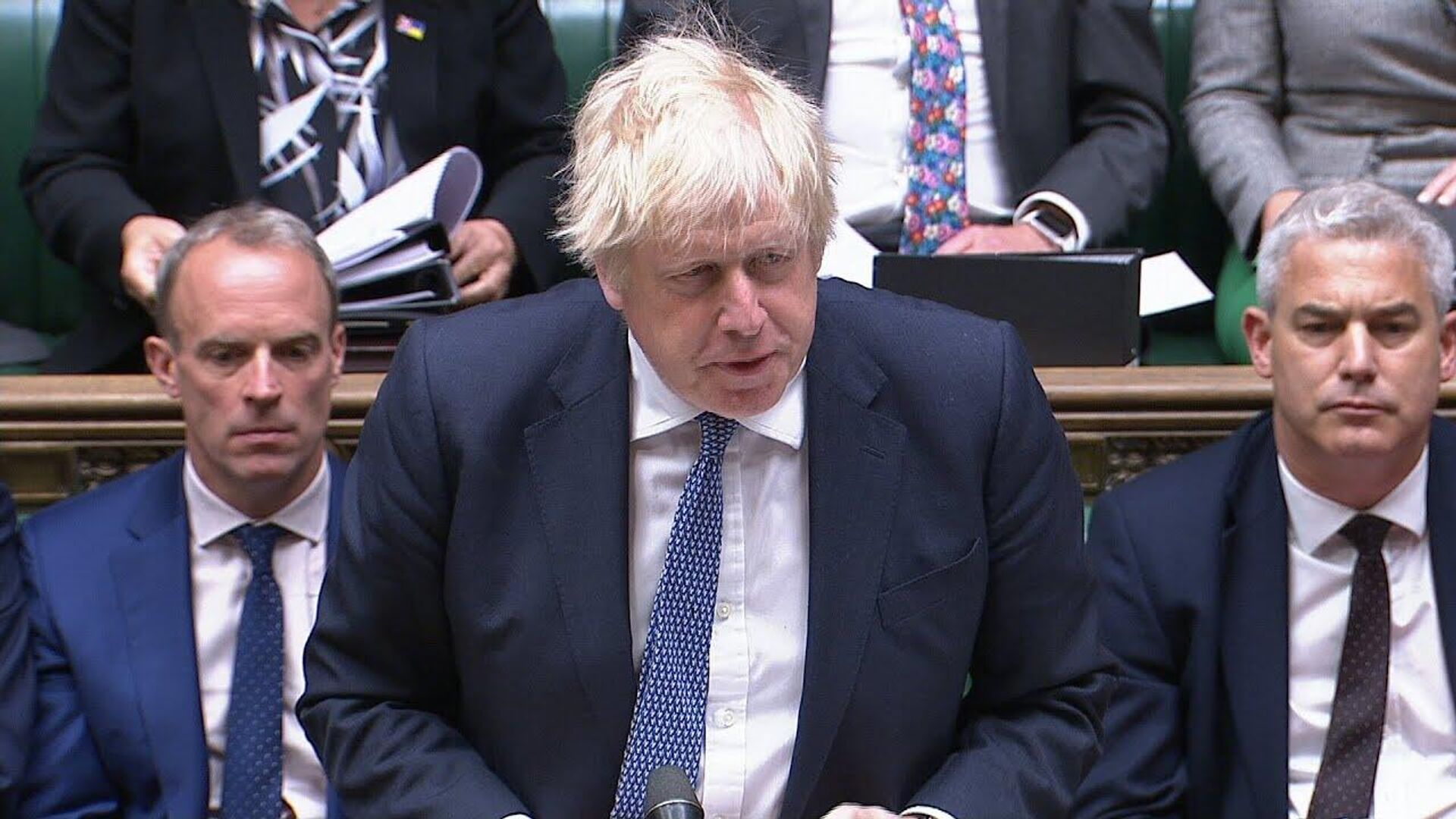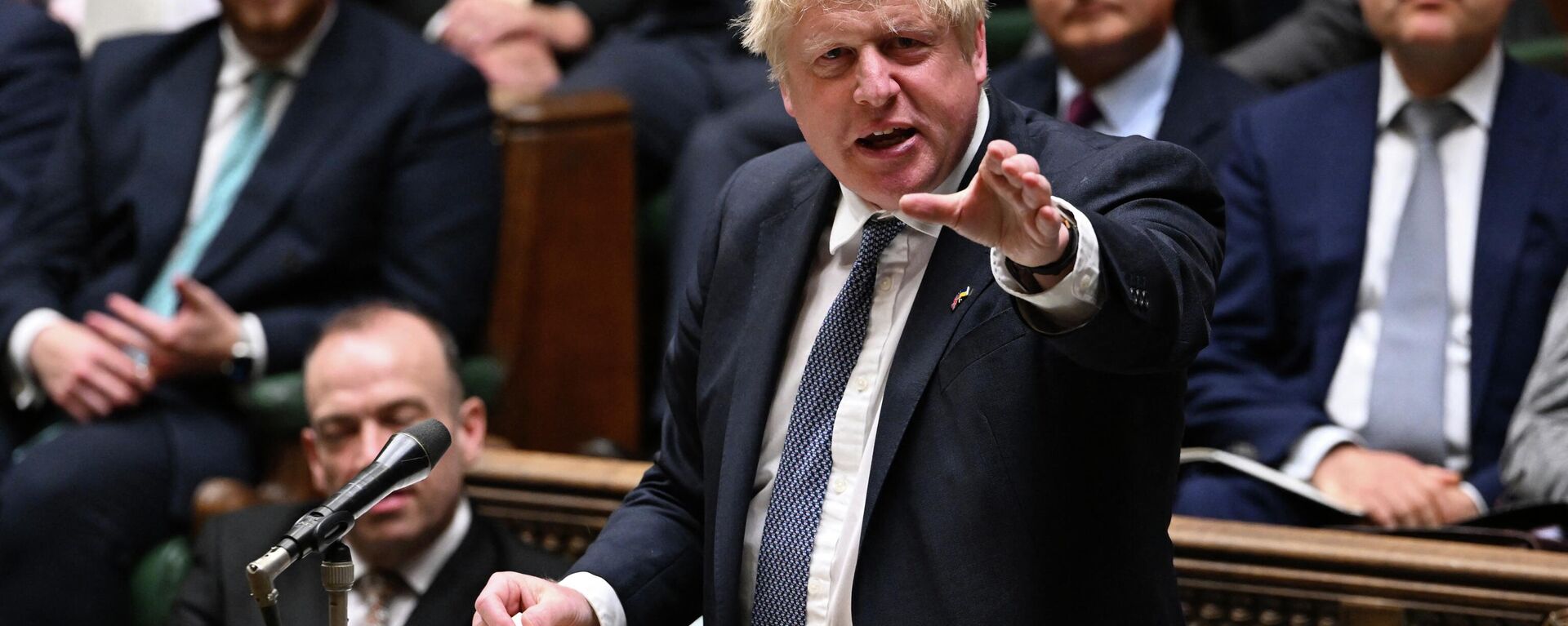https://sputnikglobe.com/20220602/bojos-revised-ministerial-code-fails-to-restore-public-trust-claims-ethics-watchdog--1095934628.html
BoJo’s Revised Ministerial Code Fails to ‘Restore Public Trust’, Ethics Watchdog Claims
BoJo’s Revised Ministerial Code Fails to ‘Restore Public Trust’, Ethics Watchdog Claims
Sputnik International
Downing Street published a revised version of the Ministerial Code on 27 May, revealing that the expectation for ministers to resign over any breach of the... 02.06.2022, Sputnik International
2022-06-02T05:39+0000
2022-06-02T05:39+0000
2023-05-28T15:19+0000
boris johnson
partygate
united kingdom (uk)
https://cdn1.img.sputnikglobe.com/img/07e6/05/19/1095767851_0:0:1280:720_1920x0_80_0_0_d3ec740cf9f1a90b472545cc604a4f08.jpg
Boris Johnson’s planned revisions to the Ministerial Code are “highly unsatisfactory” and undercut the role of the UK prime minister’s ethics adviser, according to the chair of the Committee on Standards in Public Life, Jonathan Evans, as cited by The Guardian.His criticism echoes that of Lord Christopher Geidt, the current independent adviser on ministers' standards, who failed to get increased authority to probe ministerial infractions in line with the updated version of the code, announced by Downing Street on 27 May.The mulled code overhaul follows a review by the Committee on Standards in Public Life, which made a series of recommendations for reforms in a report in November 2021. That came in the wake of the Owen Paterson lobbying “sleaze” scandal last year.Accordingly, No 10 announced last week that the revised handbook of rules for how ministers should behave would now remove the expectation for them to resign over any breach of the code, but would not allow the adviser, currently Lord Geidt, to launch his own investigation into potential infractions.The guidelines in the ministerial code still maintain that “ministers who knowingly mislead parliament will be expected to offer their resignation”.‘Suspicion Will Linger’Jonathan Evans criticised the planned review of the way the ministerial code is policed, saying that it went against the previous recommendations of his committee and would not “restore public trust” in government standards. According to Evans, unless Lord Geidt can launch his own investigations without the PM’s permission, “suspicion about the way in which the ministerial code is administered will linger”.Evans voiced agreement with Lord Geidt that the prime minister’s planned reforms to the Ministerial Code displayed a “low level of ambition”.On 1 June, the Cabinet Office dismissed reports that Lord Geidt was planning to quit over the ministerial code changes. Geidt was “definitely not resigning”, a source was cited by The Guardian as saying on Wednesday.The speculations came after Christopher Geidt suggested the PM may have broken the ministerial code when he was fined by Scotland Yard in line with the investigation into “Partygate". The Met slapped just one Fixed Penalty Notice (FPN) fine on the PM, his wife, Carrie, and Chancellor Rishi Sunak for having attended a surprise party for Johnson’s 56th birthday on 19 June 2020 that was found to have breached coronavirus lockdown restrictions. Johnson has since apologised for the incident, which he maintains he believed was a work event.Lord Geidt, in the foreword to his annual report, published on Tuesday, demanded a public explanation from Johnson as to why he believed the code was not breached in his case.Geidt also appeared to indicate he would have been forced to resign if the public explanation were not offered."If a prime minister's judgement is that there is nothing to investigate or no case to answer, he would be bound to reject any such advice, thus forcing the resignation of the Independent Adviser," he said.Boris Johnson responded by writing a letter to his ethics chief, telling Lord Geidt that he'd "considered past precedents of ministers who have unwittingly breached regulations where there was no intent to break the law" and decided that neither he nor Chancellor Rishi Sunak had violated the code.The debate over the mulled revision of the Ministerial Code comes as Boris Johnson is facing an inquiry by the Standards and Privileges Committee into whether he misled Parliament over alcohol-fuelled lockdown parties in Downing Street during COVID-19 restrictions in 2020-21. The aforementioned offence could represent a breach of the ministerial code.Earlier, both Scotland Yard and senior civil servant Sue Gray wrapped up their respective investigations into the “Partygate” row.Since then, there have been increasing calls from the opposition and Tory MPs for Johnson to resign.The latest to submit a letter of no confidence in the PM to Sir Graham Brady, chairman of the backbench Conservative 1922 Committee, was John Stevenson, the Tory MP for Carlisle.“Sadly, the Prime Minister appears unwilling to bring matters to a head and submit himself to such a vote”, he said in a statement posted on social media.Around 19 Tory MPs have now publicly confirmed submitting a letter to Sir Graham Brady, while 30 have publicly urged the MP to step down, according to The Telegraph.Ex-Tory leader Lord William Hague said on Times Radio that Boris Johnson, who was in "very serious trouble", might face a vote on his leadership by the end of June.
https://sputnikglobe.com/20220528/bojo-accused-of-watering-down-standards-to-save-his-skin-after-changing-ministerial-code-1095843863.html
https://sputnikglobe.com/20220601/wavering-mps-lobbied-to-back-bojo-as-he-faces-growing-threat-of-no-confidence-vote-report-1095914892.html
united kingdom (uk)
Sputnik International
feedback@sputniknews.com
+74956456601
MIA „Rosiya Segodnya“
2022
News
en_EN
Sputnik International
feedback@sputniknews.com
+74956456601
MIA „Rosiya Segodnya“
Sputnik International
feedback@sputniknews.com
+74956456601
MIA „Rosiya Segodnya“
boris johnson, partygate, united kingdom (uk)
boris johnson, partygate, united kingdom (uk)
BoJo’s Revised Ministerial Code Fails to ‘Restore Public Trust’, Ethics Watchdog Claims
05:39 GMT 02.06.2022 (Updated: 15:19 GMT 28.05.2023) Downing Street published a revised version of the Ministerial Code on 27 May, revealing that the expectation for ministers to resign over any breach of the code had been scrapped, while Boris Johnson's independent adviser on ministers' standards, Lord Geidt, could not launch his own breaches probe without the prime minister’s permission.
Boris Johnson’s
planned revisions to the Ministerial Code are “highly unsatisfactory” and undercut the role of the UK prime minister’s ethics adviser, according to the chair of the Committee on Standards in Public Life, Jonathan Evans, as cited by The Guardian.
His criticism echoes that of Lord Christopher Geidt, the current independent adviser on ministers' standards, who failed to get increased authority to probe ministerial infractions in line with the updated version of the code, announced by Downing Street on 27 May.
The mulled code
overhaul follows a review by the Committee on Standards in Public Life, which made a series of recommendations for reforms in a report in November 2021. That came in the wake of the Owen Paterson lobbying “sleaze” scandal last year.
Accordingly, No 10 announced last week that the revised handbook of rules for how ministers should behave would now remove the expectation for them to resign over any breach of the code, but would not allow the adviser, currently Lord Geidt, to launch his own investigation into potential infractions.
The guidelines in the ministerial code still maintain that “ministers who knowingly mislead parliament will be expected to offer their resignation”.
Jonathan Evans criticised the planned review of the way the ministerial code is policed, saying that it went against the previous recommendations of his committee and would not “restore public trust” in government standards. According to Evans, unless Lord Geidt can launch his own investigations without the PM’s permission, “suspicion about the way in which the ministerial code is administered will linger”.
Evans voiced agreement with Lord Geidt that the prime minister’s planned reforms to the Ministerial Code displayed a “low level of ambition”.
“The new arrangements fail to address the risk of what Lord Geidt describes as a ‘circular process’: an adviser who believes their advice will be rejected will simply not put forward advice at all, with the precedent already established that this will lead to the adviser’s resignation,” stated Jonathan Evans.
On 1 June, the Cabinet Office dismissed reports that Lord Geidt was planning to quit over the ministerial code changes. Geidt was “definitely not resigning”, a source was cited by The Guardian as saying on Wednesday.
The speculations came after Christopher Geidt suggested the PM may have broken the ministerial code when he was fined by Scotland Yard in line with the investigation into “Partygate". The Met slapped just one Fixed Penalty Notice (FPN) fine on the PM, his wife, Carrie, and Chancellor Rishi Sunak for having attended a surprise party for Johnson’s 56th birthday on 19 June 2020 that was found to have breached coronavirus lockdown restrictions. Johnson has since apologised for the incident, which he maintains he believed was a work event.
Lord Geidt, in the foreword to his
annual report, published on Tuesday, demanded a public explanation from Johnson as to why he believed the code was not breached in his case.
"In the case of the Fixed Penalty Notice recently issued to and paid by the prime minister, a legitimate question has arisen as to whether those facts alone might have constituted a breach of the overarching duty within the Ministerial Code of complying with the law. It may be that the prime minister considers that no such breach of his Ministerial Code has occurred. In that case, I believe a prime minister should respond accordingly, setting out his case in public", said Lord Geidt.
Geidt also appeared to indicate he would have been forced to resign if the public explanation were not offered.
"If a prime minister's judgement is that there is nothing to investigate or no case to answer, he would be bound to reject any such advice, thus forcing the resignation of the Independent Adviser," he said.
Boris Johnson responded by writing a letter to his ethics chief, telling Lord Geidt that he'd "considered past precedents of ministers who have unwittingly breached regulations where there was no intent to break the law" and decided that neither he nor Chancellor Rishi Sunak had violated the code.
"I have been fully accountable to Parliament and the British people and rightly apologised for the mistake," he said, adding: "In relation to the fixed penalty notice for my attendance in the Cabinet Room on June 19 2020, I believe that, taking account of all the circumstances, I did not breach the code".
The debate over the mulled revision of the Ministerial Code comes as Boris Johnson is facing an inquiry by the Standards and Privileges Committee into whether he misled Parliament over alcohol-fuelled lockdown parties in Downing Street during COVID-19 restrictions in 2020-21. The aforementioned offence could represent a breach of the ministerial code.
Earlier, both Scotland Yard and
senior civil servant Sue Gray wrapped up their respective investigations into the “Partygate” row.
Since then, there have been increasing calls from the opposition and Tory MPs for Johnson
to resign.
The latest to submit a letter of no confidence in the PM to Sir Graham Brady, chairman of the backbench Conservative 1922 Committee, was John Stevenson, the Tory MP for Carlisle.
“Sadly, the Prime Minister appears unwilling to bring matters to a head and submit himself to such a vote”, he said in a statement posted on social media.
Around 19 Tory MPs have now publicly confirmed
submitting a letter to Sir Graham Brady, while 30 have publicly urged the MP to step down, according to The Telegraph.
Ex-Tory leader Lord William Hague said on Times Radio that Boris Johnson, who was in "very serious trouble", might face a vote on his leadership by the end of June.





